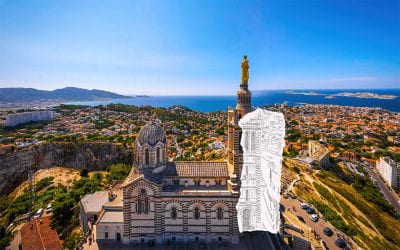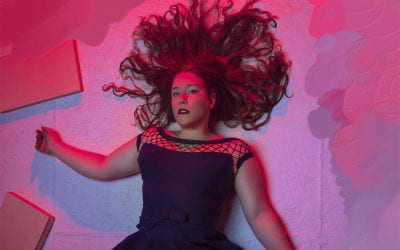traveling while home: self-discovery through the local
EXECUTIVE DIRECTOR AND DIRECTOR OF THE HONORS PROGRAM
How can you make the long trip home if you don’t actually leave there? How can you see what is already familiar as a new destination, a new place with which to reckon? What if that place is your campus or city, and where you already live?
In the Roosevelt University Honors Program, we ask students to experience space and place—our campus, city, and region—as sites for action, experience, and reflection, not simply as places we passively inhabit. A supplemental academic program for undergraduate students, the Honors Program serves students seeking immersive academic experiences and challenges to broaden and deepen their intellectual inquiry in and out of the classroom. Each year, as part of our co-curriculum, we offer a year-long experience called the Honors Exchange. We call it an “exchange” to emphasize acts of giving and receiving, especially as interlocutors and learners. There are two constants in this curriculum: being out and about, together, in the city and region, and inviting guests and experts into our learning community to bring their experience and expertise to bear on our inquiry. Our topics vary from year to year, but are always timely, broad in scope, and rich in possibility.
Marjorie, when she was new to her then-position as director of the Honors Program, attended a summer institute led by the National Collegiate Honors Council. The Council provided its members guideposts and reference points for understanding what Honors means in higher education, where we see learning as a means to thrive, and curiosity as an essential component of citizenship. At the institute, members discussed study abroad, as it’s one of the most common ways students encounter this kind of learning. It offers rich, immersive experiences that force acclimation and ask students to acculturate to the new and unfamiliar. Study abroad also challenges students to embody the cross-cultural experience—something which can be a complicated process. From deep within unfamiliar territory, students confront and engage with difference openly, knowing they will be changed (and can’t help but be) by the encounter.
It’s a complicated task to embed and teach to abstract and plural concepts like citizenship and intellectual curiosity, but one of the pedagogical models designed by NCHC works delicately and innovatively to do just that. “City as Text” invites students and facilitators, as Sarah Maria learned in another summer institute, to directly interact with and critically reflect on place as its own kind of living text, and to study it through multiple disciplinary perspectives for field-based, participatory learning.
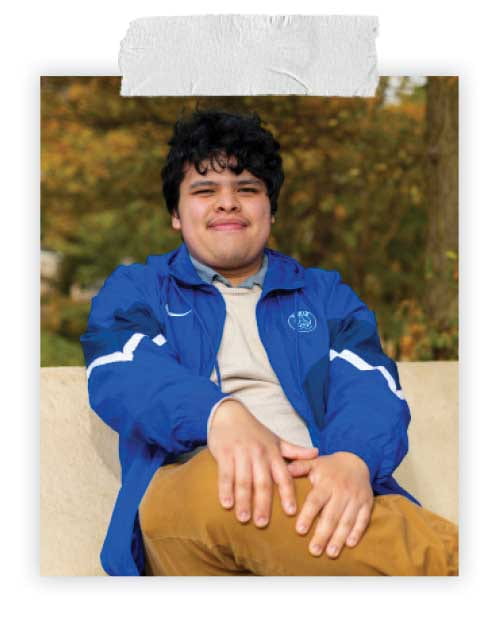
Cesar Gonzalez
We wondered: what would it mean for Roosevelt’s Honors Program to take this pedagogical framework to our local environment? Instead of seeking the unfamiliar, could we see the ordinary as novel, and the people and places with which we interact with every day as extraordinary and new? Where else could we be today, while still standing where we always do, while asking new questions about what we always see? And while leaving familiar territory is exhilarating, there’s also something especially rich about “traveling while home.”
We set out to invite students to experience our everyday spaces and places—our home, region, and city and their complex pasts and presents, their culture and politics—from fresh, even challenging perspectives. It’s as junior Cesar Gonzalez (he/him), an English major and political science minor, observes: “The Exchange is an experience that taught me to appreciate everyday things because everything, as I learned, has an exciting story waiting to be told.”
When senior Mia Moore (she/her), a history major with minors in sociology and social justice studies, was a freshman, she learned in her first honors course “that ‘different’ does not mean wrong, and that thinking creatively was one of the program’s guiding philosophies.” That year, she also became our research assistant for what eventually became “The Jane Project.” Little did we know, when we started that project, how much Mia’s critical engagement created a “mapping” that still informs how we plan and execute the Exchange. She wove together the lives of the Chicago Janes, including early 20th century social reformer and activist Jane Addams, Mayor Jane Byrne, and women of the Jane Collective. Mia says, “For me, putting the Janes into conversation with one another was the ultimate embodiment of Honors and what it means to be a part of the program.” If the theme of “study abroad” was a catalyst for the design of the Honors Exchange, Mia’s explanation of her “journey” of self-discovery with these notable Chicago Janes became a shorthand for the sort of intellectual travels we take with students in the Honors Program.
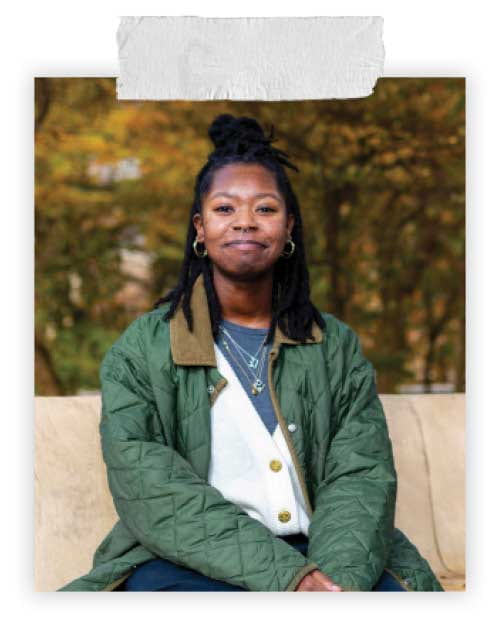
Mia Moore
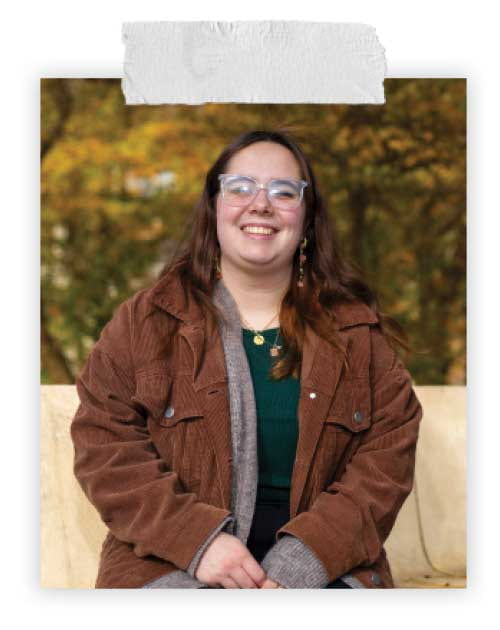
Madeline LaFrombois
While this experience has some features of a college class—like assigned texts to read, watch, or listen to, and students producing work to demonstrate their learning throughout—this Honors education is not so much instructor-led as it is student-directed, nourishing students’ curiosity by having them discover that learning occurs everywhere all the time. When we start with the assumption that the ordinary, the commonplace, is worth our study, students lead with questions about that which they want to know. Sophomore hospitality major and psychology minor Madeline LaFrombois (she/they) explains, “[The Exchange] gave me an outlet to not focus directly on class. I love learning, but the structure of classes and stress of grades takes away from that passion.” In the Honors Exchange, students are free to explore what they discover in their journeys.
Like models of study abroad, we center “travel” in the Honors Exchange because it conceptually forces us to see and move through our spaces from various vantage points. Over the past several years we’ve traveled to an academic conference at Carroll University in Wisconsin; to a research university library archive where we marveled over 19th century dance cards; to a play at downtown Chicago’s famed Lookingglass Theatre; and we even took a tour of our own Auditorium Building and Theatre.
Transformative experiences apply a gentle kind of intellectual pressure, and us to rethink and unlearn when we encounter new information. Some of our most transformative Honors Exchange experiences actually started in a classroom. During the 2023-24 academic year, we partnered with the cultural non-profit Chicago Architecture Center (CAC), working closely with senior director of learning and community engagement programs, Angela Esposito (she/her). Tucked away in the back of the CAC is a modern classroom where our students—a large group that included Madeline, who’s from a suburb of Milwaukee, Cesar, who grew up on Chicago’s Southside, and Lydia Groezinger (she/her), who hails from rural western Illinois—worked together. That day, they were given a formidable task with simple instructions and paper, post-its, and markers: create a neighborhood. Two groups huddled together to discuss and debate, to create ecosystems while designing their ideal neighborhoods, asking questions like, “Who lives here, and what do they need and want?” Together, they deliberated and identified the essentials: green spaces, schools and libraries, access to quality food, services for residents of different ages, and more. This exercise illuminated, as we design, construct, and interact with our immediate environments, whose needs get met, and whose values are expressed in the spaces and places we share with others. Starting with this activity created the foundation for the travel that was to come.
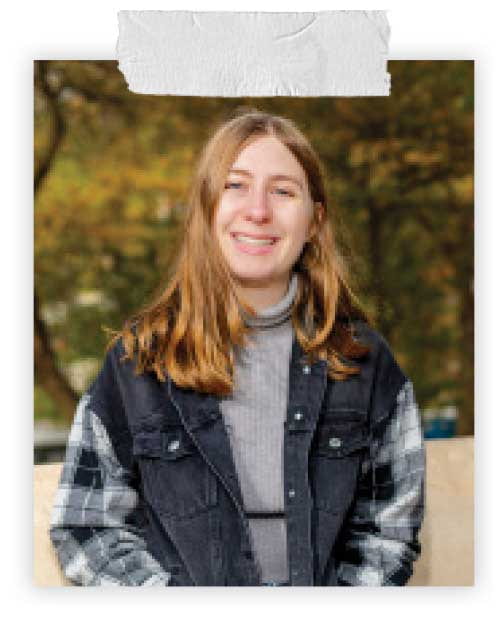
Lydia Groezinger
Angela, our intrepid docent, guided us throughout our year together in the Honors Exchange, to ask questions about design, about the “mapping” that orientates us to space and place. The most provocative question, the one that sticks with us and our students, is “Who is this city/place for?”Roosevelt’s origin story still poses that question: “Who is this university for?” Teaching about and for social justice, the Honors Exchange reveals to us, happens best through deliberate study, action, and immediacy. Just as Mia was transformed by her journeys with Chicago Janes, developing intimate relationships with our built environments changes our perspectives on the world and its locations, and also changes how we interact with them. Lydia, a senior English major with a creative writing concentration, grew up on a dairy farm; she describes her learning in the Exchange this way: “I’ve begun to understand successfully living in the city as a type of fluency. You have to know the social rules, expectations, and functions, which tend to be different from those in rural areas.”
Students carried this framing, that fluency and literacy, with them for a neighborhood walkabout, modeled after NCHC’s “City as Text,” for a project called “On Foot in Chicago’s First Five.” Small groups planned trips together during the winter months to Bronzeville, Chinatown, Greektown/West Loop, Little Italy, and Pilsen. These neighborhoods, the first five to be recognized as such in Chicago, are located close to our campus and their rich, unique histories factored into how students planned for their trips. They researched these places in advance, reading and learning through description and story. While there, they took field notes: What buildings did they see? What were their features? What spaces did they see? Were they for the public? Who was there? What were they wearing? How were people getting around? Also, importantly, who and what wasn’t there? Students considered what they didn’t or couldn’t learn from their preparatory research; how was being on foot a distinct kind of research, especially in that it cannot have a predetermined outcome? We came back to that CAC classroom where students presented collaborative storyboards and maps that narrated their analysis. What they brought to us revealed intimacy and amazement, hearkening back to that early neighborhood-building session, where students posited ideal neighborhoods, in contrast to the lived realities they experienced in the walkabout. Lydia notes, “It’s one thing to know a building every day by walking by, but it’s another to understand the context of why it was built and how it impacts the city today.”
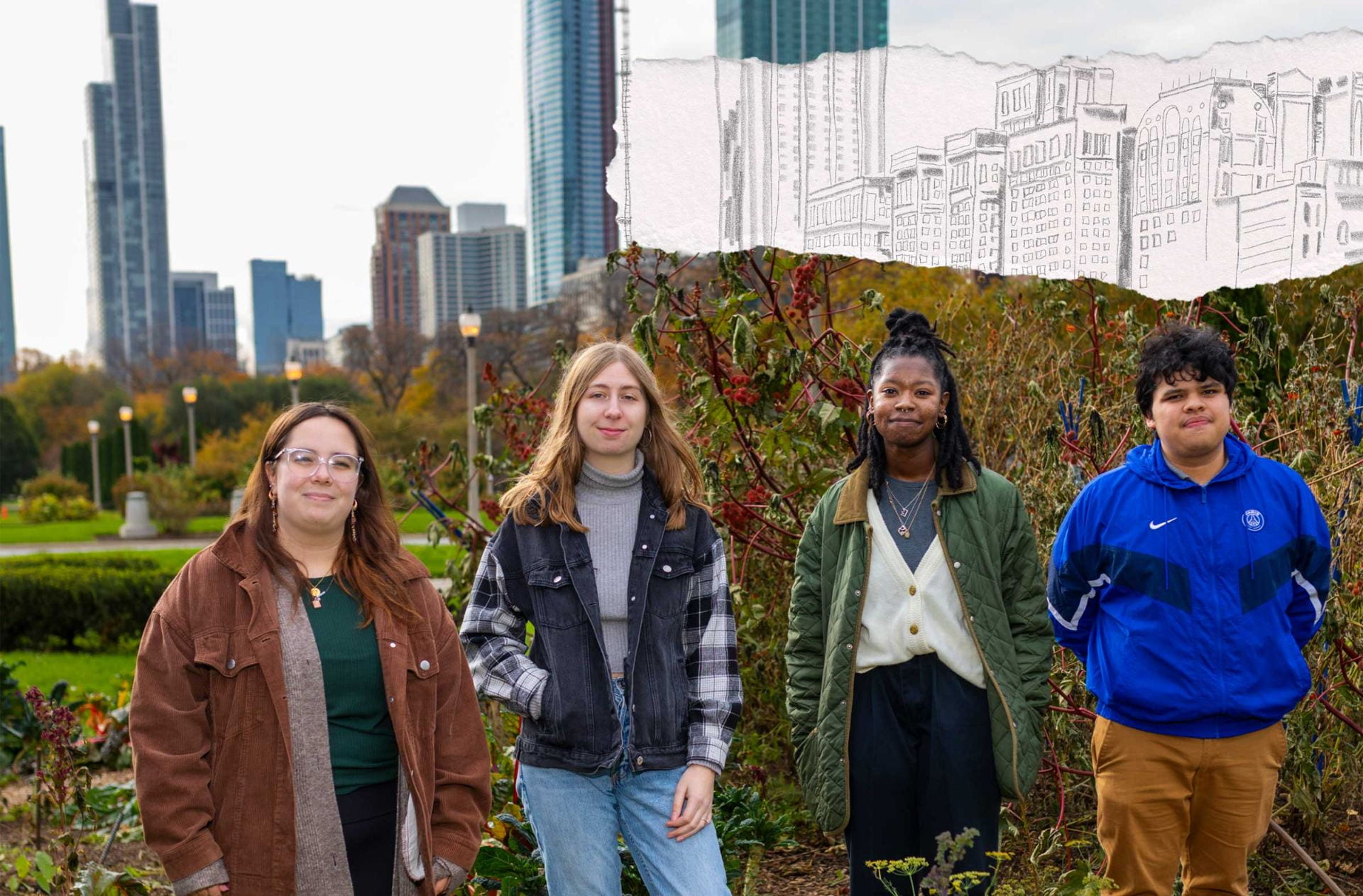
For our final Exchange session in the spring, we all traveled, together, on a bus, with Angela as our guide, through those first five Chicago neighborhoods. She explained the past and the present iterations of these places’ features, architecture, and people. Cesar marvels about this tour: “Not only did I get to see all these fantastic neighborhoods, but I now looked at the city as a larger cultural entity than it already was. I loved how the town wasn’t only a new, modern skyscraper-topia. Looking closely, you could see the city’s history and the marks of the people who built it.”
Cesar now travels his city with and through this discovery. Madeline continues to find value in collaboration and in “learning how to learn.” Each year, in the Exchange, we invite students to travel alongside and collaborate with us, both literally and figuratively, and it is they who lead. Students see themselves in new ways, reconsider how and what they think, and ask where “here” is, those places to where you go when you leave “home.” A lasting memory for us, the authors, that haunts and fills us with hope, resonates: As we left the Lookingglass Theatre, after watching a Sunday matinee of the play Her Honor, Jane Byrne and engaging with some of the principal actors in a talkback, darkness and wet snow fell around us. Michigan Avenue and its buildings and sidewalks were awash in lights and color from cars and holiday decor, and the hum of the city and its people made us realize, in that moment–Here: Where we are, changed by this experience, by this play, by our study, by our students.
Like Cesar says, “It’s not just a world, it’s a story of the people who made it.” The Honors Exchange presumes we are already touring where we already are, but we can always ask “Where should we be today?” These trips are long, and worth it. Adopting this self-efficacy, combined with an amplified capacity for wonder, are necessary ingredients for lifelong learning, a central aim of Roosevelt’s Honors Program. We imagine our students radiating these traits over their lifetimes in their communities, workplaces, families, in the places they make their homes and travel to, equipped to do so through their education at Roosevelt University.
Think of the long trip home.
Should we have stayed at home and thought of here?
Where should we be today?
— Elizabeth Bishop, “Questions of Travel”
More in this section
unexcused absence
Some of life’s most important lessons cannot be taught inside the four walls of a classroom. Matthew Beardmore’s travel has forced him to reassess how he thinks about work, family, politics, injustice and many other issues. He’s no longer tied to the beliefs of where he grew up.
creating a new travel niche while wandering the globe
In early 2011, Sahara Rose De Vore bought a one-way ticket to Costa Rica. Over the next 10 years, she explored 84 countries. The self-discovery she experienced inspired her to launch two successful businesses—both helping others discover the benefits of travel.
Opera’s leading role in transforming gender identity in the arts
Lucia Lucas is a force—both on stage and off. In April, Lucia made history during her debut at the Lyric Opera of Chicago as the first openly transgender person to perform there in a leading role.

